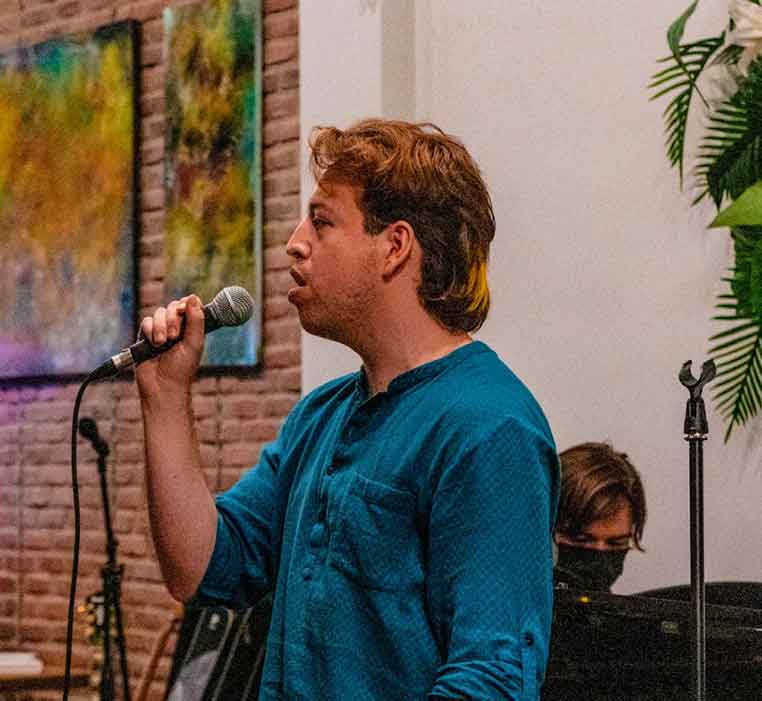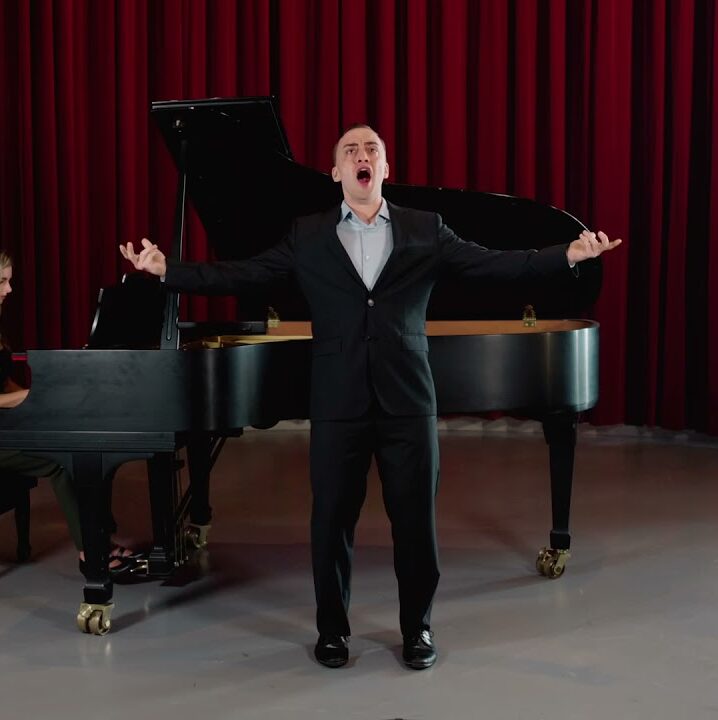vocal coaches at Express Voice Studio
Each of our “Artists Who Teach” are hand selected. We look back on our own training and ask: Who would we have loved to work with? Who in the Canadian music scene is impressive for their own voice, their vocal range, vocal strength, and versatility?
Whether you are learning to sing, need advanced vocal technique work, or guidance on expanding your voice acting capabilities- we have teachers for you. But not just teachers: Vocalists.
Opera Singing Voice
Discover the artistry of opera with our highly educated and distinguished opera vocal coaches. Our instructors specialize in the classical techniques and styles essential for mastering the operatic stage. Not just great for aspiring opera singers- these artists are masters of vocal technique, from breathing to stamina and range. If you want to become the ultimate performer as an actor or singer, you will benefit from private coaching with these artists.
Step into the spotlight with confidence alongside our musical theatre vocal coaches. From Broadway classics to contemporary hits, our coaches provide expert guidance tailored to the unique demands of musical theatre performance. Belting isn't for the weak- learning how to sing this style takes dedication, power, and even upkeep for those now at advanced levels.

Anu Budz
-Online & Montreal
-Rap
-Adults & Kids
-Self Producing / Branding
*Contact Us For Details

Kaden Forsberg
-Stage Acting
-Vocal Coach
-Toronto
More About Your Coaching Lesson
“Vocal lessons” and “singing lessons” are terms often used interchangeably, but there can be slight differences in their connotations depending on the context and the preferences of individual instructors or institutions. Here’s a breakdown of the general differences:
Voice Lessons
– Focus on Overall Vocal Technique: Vocal lessons typically encompass a broader spectrum of vocal training. They may involve instruction on breathing techniques, vocal exercises, vocal health, music theory, ear training, and performance skills.
– Holistic Approach to Voice: Vocal lessons aim to develop a singer’s entire vocal instrument, including tone, range, flexibility, dynamics, resonance, and expression.
– Suitable for Various Styles: Vocal lessons can cater to singers of various genres, including classical, musical theatre, pop, jazz, rock, R&B, and more.
– May Include Performance Preparation: Vocal lessons may also involve coaching for auditions, competitions, or stage performances.
Singing Lessons
– Primarily Focus on Singing: Singing lessons typically center on the act of singing itself. They emphasize vocal exercises, repertoire selection, interpretation, and performance techniques specific to singing.
– Targeted Improvement in Singing Skills: Singing lessons often concentrate on refining a singer’s performance abilities, including pitch accuracy, phrasing, diction, emotive delivery, and stage presence.
– Adaptable to Various Genres: While singing lessons can cover a wide range of musical styles, they may lean towards specific genres based on the instructor’s expertise or the student’s interests.
– May Focus on Repertoire Development: Singing lessons may involve selecting and working on songs that best showcase the student’s voice and style preferences.
While online singing lessons offer many advantages, they can also present unique challenges. Here are a few common challenges and tips for overcoming them:
1. Technical Issues: Ensure that you have a stable internet connection and test your equipment before each lesson. If you encounter technical issues during a lesson, communicate with your instructor and try troubleshooting together. It’s important to address any technical issues promptly to minimize disruptions to your learning.
2. Lack of Physical Presence: Online lessons lack the physical presence of an instructor, which can make it challenging to receive immediate physical corrections. However, many instructors provide visual demonstrations and verbal instructions to compensate for this. Pay close attention to their cues and ask for clarification if needed.
3. Distractions at Home: Home environments can be prone to distractions, such as family members, pets, or household chores. Establish clear boundaries with your loved ones and create a quiet space where you can focus on your lessons without interruptions.
4. Lack of Personal Connection: Building a personal connection with your instructor is important for effective learning. Take the initiative to communicate with your instructor, ask questions, and share your goals and concerns. This will help foster a strong mentor-student relationship, even in an online setting.
By acknowledging and addressing these challenges, you’ll be able to navigate your online singing lessons more effectively and make progress towards your singing goals.
-Aspiring singers can greatly benefit from vocal coaching by learning essential techniques to sing effectively. Through tailored guidance, they can develop proper breathing exercises, improve vocal range, and refine their performance skills, enhancing their abilities to sing effectively in various musical genres and settings.
Vocal coaching plays a crucial role in preparing aspiring vocalists for live performances in musical theatre by providing them with the necessary skills and techniques to excel on stage. Through targeted coaching sessions, performers can learn to project their voices, maintain vocal health, and master the demanding vocal requirements of musical theatre productions, ensuring memorable and impactful performances in front of live audiences.
Vocal coaching serves as a cornerstone for aspiring vocalists aiming to thrive in the competitive music industry. By honing their skills through personalized coaching, vocalists can develop the ability to sing effectively across various genres, navigate recording studio sessions with confidence, and deliver compelling live performances that captivate audiences. This comprehensive preparation equips them with the tools needed to pursue successful careers in the dynamic landscape of the music industry.
Vocal coaching provides aspiring singers with strategies to address performance anxiety and bolster their confidence on stage. Through targeted coaching sessions, singers learn relaxation techniques, mental preparation exercises, and stage presence skills that help alleviate anxiety and enhance their ability to connect with audiences. By cultivating a supportive environment and offering personalized guidance, vocal coaches empower aspiring singers to channel nervous energy into dynamic performances, ultimately enabling them to thrive in live performance settings.
Vocal coaching plays a pivotal role in facilitating the transition of aspiring vocalists from solo performances to ensemble work in live settings. By focusing on vocal blending, harmony techniques, and ensemble dynamics, vocal coaches equip singers with the skills necessary to collaborate effectively with other performers. Through ensemble-focused coaching, vocalists learn to balance their individual voices within a group context, synchronize their timing and phrasing, and deliver cohesive performances that showcase the collective strength of the ensemble.
Student Alumni

Alex Nicol

Tara

Rebecca

Laurena Mayifuila Mayowele

Samantha Timmons

Julian Basurto






























